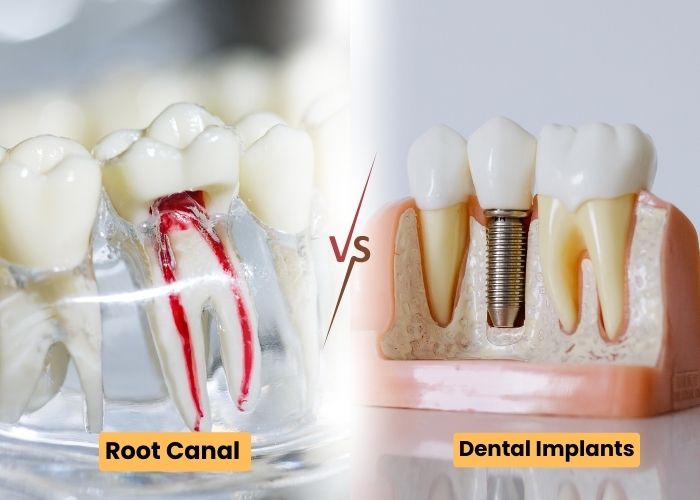Root Canal vs. Dental Implants: Cost Comparison and Long-Term Savings

When it comes to saving a tooth, the choice often comes down to root canal treatment or a dental implant. Each option has its perks and price tag, but what about long-term value? Let’s take a look at how these two options stack up, from immediate costs to the potential savings down the road.
The Initial Cost Breakdown: Root Canal vs. Dental Implants
At first glance, root canal treatment seems like the more budget-friendly choice. Root canal costs generally depend on tooth location, the complexity of the case, and where you live. On the other hand, dental implants cost much higher. But here’s where things get interesting: while root canals may be less expensive up front, implants can sometimes offer more long-term value if you’re looking at durability.
Why the price difference? Root canal treatment focuses on saving your natural tooth by removing the damaged or infected pulp, cleaning it out, and sealing it up. Dental implants, on the other hand, are a more involved process, including surgery to place the implant post into the jawbone and then attaching a crown. This process is more complex, which adds to the initial price, but it also means that an implant can last a lifetime with good care.
Longevity and Maintenance: What’s the Real Investment?
A big question to consider is how long each option lasts. Root canals have a solid success rate, and with proper care, the treated tooth can last many years. However, a root canal-treated tooth may sometimes need additional treatment, like a crown replacement or even retreatment if an infection occurs down the road.
Dental implants, on the other hand, are designed to be a permanent solution. Because implants replace the entire tooth structure, including the root, they don’t rely on the original tooth for support. This durability can translate into lower maintenance costs in the long run. In fact, some dentists say that an implant, once fully healed, is about as low-maintenance as a tooth can get.
Follow-Up Costs: Potential Savings in the Long Run
Let’s talk follow-up costs because they can sneak up on you. With a root canal, you’ll likely need a crown to protect the tooth, which adds around ₹20,000 to ₹50,000 to the bill. Over time, crowns may need replacement due to wear, especially if you’re grinding your teeth or chewing on hard foods regularly. These additional costs may make a root canal a pricier choice over the years.
A dental implant, while pricier upfront, usually doesn’t need replacement if it’s cared for properly. Implants are made from materials like titanium and porcelain, which are highly resistant to decay. Many patients find that while they pay more initially, implants save them money over the years because they avoid the repeated costs associated with maintaining a treated natural tooth.
Comfort and Functionality: Do Both Options Feel the Same?
If you’re looking for something that feels like your natural tooth, dental implants may be the closest you can get. Because implants are embedded in the jawbone, they mimic the stability of a natural tooth and function seamlessly.
Root canal treatment can save your natural tooth, which is great, but in cases where extensive decay is involved, some patients report the tooth feeling a bit more sensitive over time.
A bonus point for implants: they also help maintain your jawbone structure. When a tooth is lost and not replaced, the jawbone can begin to deteriorate. Implants prevent this by fusing with the bone, which keeps everything strong and stable.
So, Which is the Better Value for Your Money?
The best choice depends on your dental needs and your goals for long-term savings. For those who want to keep their natural tooth and prefer a less invasive approach, root canal treatment is an excellent option. It's generally more affordable up front and allows you to save what’s left of your tooth structure.
However, if you’re looking for a permanent fix and don’t want to worry about potential re-treatment costs, an implant might be worth the initial investment. Many people who choose implants find they offer better value in the long run, as they don’t need replacements, won’t decay, and help maintain a natural feel.
Ultimately, both treatments are excellent options that can restore your smile – it just depends on your priorities. Whether you opt for root canal treatment to save your tooth or go for the lasting solution of an implant, there’s a choice that aligns with both your budget and long-term goals.
Still confused between dental implants and root canal treatment?
Book an appointment with our expert and get clear and precise answers to your problems.
Note: The above information is for educational purposes.
